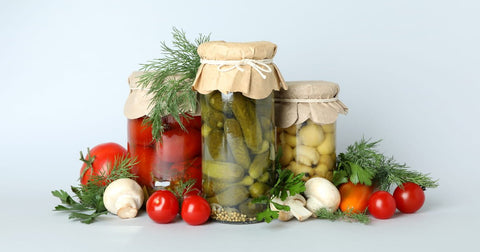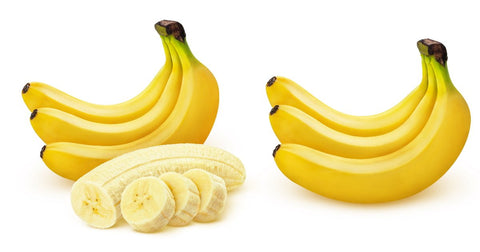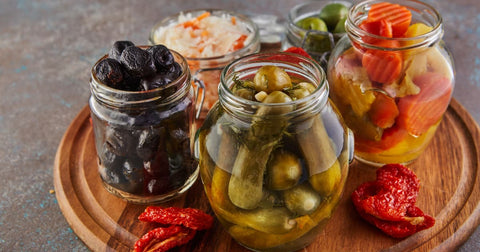Pickled vegetables - those tangy, crunchy delights that liven up salads, sandwiches, and charcuterie boards - have been enjoyed for centuries. But are they actually good for you? Specifically, are pickled vegetables good for your gut? Let's dive in!

Are Pickled Vegetables Good for Your Gut? The Probiotic Powerhouse
Yes, certain pickled vegetables can be excellent for your gut, but there's a catch: they need to be fermented.
Fermentation is a process where natural bacteria convert sugars into lactic acid. This not only preserves the vegetables but also creates probiotics – those "good" bacteria that play a pivotal role in your gut health.
On the other hand, quick pickling with vinegar, while still delicious, doesn't produce the same probiotic benefits.
Benefits of Pickled Vegetables: Beyond the Gut

Beyond the gut, pickled vegetables have other potential perks:
- Nutrient Boost: Pickling can preserve and even enhance the nutrient content of vegetables, especially vitamin C and certain B vitamins.
- Antioxidant Power: Many pickled vegetables, like beets and red onions, are rich in antioxidants, which fight cell damage and may reduce the risk of chronic diseases.
- Digestive Aid: The acidity of pickled vegetables can stimulate the production of digestive enzymes, potentially aiding digestion.
Health Benefits of Pickled Vegetables: A Closer Look
Fermented pickled vegetables have been linked to a range of health benefits, including:
- Improved Gut Microbiome: Probiotics support a balanced and diverse gut flora, crucial for optimal digestion and overall health.
- Enhanced Immune Function: A healthy gut is linked to a strong immune system.
- Reduced Inflammation: Some probiotic strains found in pickled vegetables may have anti-inflammatory effects.
- Potential for Weight Management: Fermented foods can help regulate appetite and promote a feeling of fullness.
Do Pickled Vegetables Have Probiotics? The Fermentation Factor

As mentioned, only fermented pickled vegetables contain live probiotics. If you're looking for the gut-friendly kind, search for labels stating "lacto-fermented" or "naturally fermented."
Food Intolerance and Pickled Vegetables: Navigating Sensitivities
While generally safe, some pickled vegetables can trigger digestive symptoms in people with food intolerances or sensitivities.
For example, high-FODMAP vegetables (like onions or garlic) might be problematic for those with Irritable Bowel Syndrome (IBS). Similarly, vinegar used in some pickling can irritate those with acid reflux.
If you experience any digestive discomfort after eating pickled vegetables, a food sensitivity test can be a valuable tool in pinpointing the culprit.
Incorporating Pickled Vegetables into Your Diet

Adding fermented pickled vegetables to your diet is simple and delicious:
- Snack on them: Enjoy a few spears as a crunchy, tangy snack.
- Add to salads: They bring a flavorful punch and enhance the nutritional value of your salads.
- Top sandwiches and burgers: Ditch the plain old dill pickle and try something more adventurous.
- Pair with grilled meats or fish: The acidity complements rich flavors.
Key Takeaways:
- Fermented pickled vegetables are a good source of probiotics, promoting gut health and overall wellness.
- They also offer additional benefits like improved immunity and antioxidant protection.
- Choose lacto-fermented pickles for maximum benefits.
- If you experience any digestive issues, a food sensitivity test can help identify trigger foods.
Remember, incorporating a variety of fermented foods into your diet, including pickled vegetables, is a simple yet powerful way to support a thriving gut and a healthy you.
Frequently Asked Questions:
1. Are all pickled vegetables good for my gut?
No, only fermented pickled vegetables have significant probiotic benefits. Look for "lacto-fermented" or "naturally fermented" on the label. Vinegar-pickled varieties are tasty, but they lack the live, beneficial bacteria.
2. Can I eat pickled vegetables every day?
Absolutely! Incorporating a moderate serving of fermented pickled vegetables into your daily diet is a great way to support your gut health. However, remember to watch the sodium content, especially if you have dietary restrictions.
3. Which pickled vegetables have the most probiotics?
The probiotic content can vary, but traditionally fermented vegetables like sauerkraut, kimchi, and some pickle varieties tend to have a richer diversity and abundance of these beneficial bacteria.
4. Can pickled vegetables help with weight loss?
Fermented pickled veggies can indirectly aid in weight management. They're low in calories, high in fiber, and may help you feel full and satisfied, potentially curbing overeating.
5. I have IBS; can I still eat pickled vegetables?
It depends. Some individuals with IBS might experience discomfort from fermented foods or high-FODMAP vegetables commonly pickled (like onions or garlic). Introduce them slowly and observe your body's response. If in doubt, consider a food sensitivity test for guidance.


.png?v=1737390083)
.png?v=1737187409)


